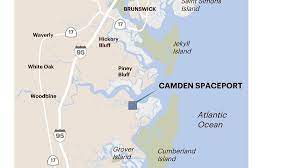
ATLANTA – A planned commercial spaceport in southeastern Georgia has achieved a major milestone.
The Federal Aviation Administration (FAA) issued a long-anticipated “record of decision” Monday approving a launch site operator license for Spaceport Camden. The license authorizes up to 12 small-vehicle launches per year.
“In the 20th century, Camden County was declared the ‘Gateway to Space,’ ” said Steve Howard, Camden County administrator and project lead for Spaceport Camden, referring to the county’s role as a rocket testing location and alternative launch site for the Apollo program.
“With this license, we have retained that title again in the 21st century. … Georgia is part of the new space race, and we will become one of the leaders.”
“It has been long time coming, but Camden County is immensely proud of this accomplishment,” added Camden County Commission Chairman Gary Blount. “With this license … we are no longer a one-dimensional economy solely reliant on the brave sailors and contractors at Naval Submarine Base Kings Bay for economic prosperity.”
Camden County officials and other backers of Spaceport Camden – including many of Georgia’s top political leaders – have been working for more than five years to get the project off the ground.
They have pitched Spaceport Camden as an economic engine that ultimately could create up to 2,000 jobs and help sway a new generation of aerospace engineers, many graduates of Georgia Tech, to remain in the state while pursuing their careers.
But the project has been beset by either concerns or outright opposition from a host of parties, including property owners on Little Cumberland Island – which lies in the path of the planned launches – environmental groups, the National Park Service – which operates the Cumberland Island National Seashore – and the U.S. Navy.
Among those expressing reservations is U.S. Sen. Raphael Warnock, D-Ga., who asked the FAA in a letter last May to slow down its review of the project.
Among other things, the letter cited a decision to change the project’s design from launching medium-to-large rockets to small rockets.
The county’s revised application revealed that 20% of small rockets launched from Spaceport Camden would likely fail, a much larger failure rate than would occur with medium-to-large rockets, Warnock wrote.
“Virtually from the start, the FAA’s review of Spaceport Camden has been fraught with factual mistakes and legal errors,” said Brian Gist, senior attorney for the Southern Environmental Law Center. “We will carefully review the FAA’s decision to ensure that it fully complies with all applicable laws.”
Some of Spaceport Camden’s opponents have gone to court seeking an injunction to stop the project until a voter referendum can be held on whether the county can buy the property where the spaceport would be located. A ruling could come early next year.
Despite granting the operator license, the FAA still must approve each individual launch separately.
